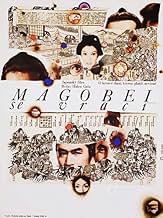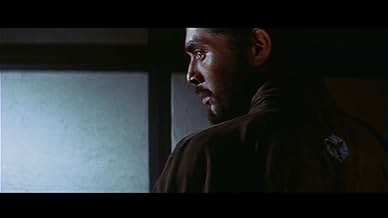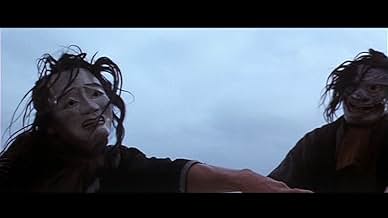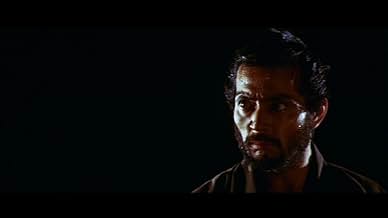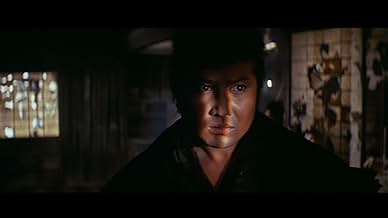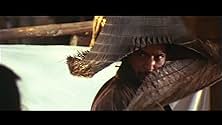VALUTAZIONE IMDb
7,6/10
2759
LA TUA VALUTAZIONE
Un guerriero samurai tormentato dai sensi di colpa tenta di fermare un massacro in corso.Un guerriero samurai tormentato dai sensi di colpa tenta di fermare un massacro in corso.Un guerriero samurai tormentato dai sensi di colpa tenta di fermare un massacro in corso.
- Premi
- 2 vittorie e 1 candidatura in totale
Recensioni in evidenza
I saw this film in the late 1970s. It was called "Goyekin - The Emperor's Gold". As I watched our guilt-ridden hero return to fulfill his promise, really a threat, to punish his family if they repeated their crime. I still see the image of him striding along the beach with a conical hat pulled low. The shadow on his face made his eyes glow under the hat and the shot was taken with a telephoto through wispy beach grass. Completely memorable. Then the scene in the forest with the horsemen riding through. It looked like an ancient Japanese painting with hazy colors and an other-worldliness that was amazing. Then the concluding duel in the snow. Two brilliantly attired samurai dueling in a pure white, glistening environment. So many great images from one film!
The film itself is a pretty typical revenge film with some twists. When Tom Laughlin tried to redo it as a Mexican western,"The Master Gunfighter", it just fell flat. But the samurai movie has an entertaining plot and good action characters with beautiful settings. I think this film is a special case of cinematographic excellence. See it and enjoy the beauty.
The film itself is a pretty typical revenge film with some twists. When Tom Laughlin tried to redo it as a Mexican western,"The Master Gunfighter", it just fell flat. But the samurai movie has an entertaining plot and good action characters with beautiful settings. I think this film is a special case of cinematographic excellence. See it and enjoy the beauty.
I saw "Goyokin" in 1969 at a small theater in Yokohama, Japan. It was in Japanese, of course, but the evolution of the story was understood. The film was so well done, and beyond what I was used to as an American watching Japanese movies in Japan. The acting was superb and the tension was palpable. The story was unique and its presentation was gorgeous. It's not hyperbole to say I was awestruck. With the advent of VHS I began searching for this movie as a video. After years of searching, I bought a barely watchable re-re-re-reprint with multiple subtitles. I was happy to HEAR the movie again! Tom ("Billy Jack") Loughlin made the putrid, displaced "The Master Gunfighter" but it was ludicrous as a Western. I will never understand why this classic has not been produced as a Video! Obviously, many people know about it, and it appears on wish lists throughout the world. It deserves the full DVD treatment and, PLEASE, while the great Tatsuya Nakadai is still alive to provide commentary on it.
After reading all the raves about this movie I was looking forward to finally watching it. I have to admit to being somewhat let down. Mind you it is a good movie with Nakadai putting in a great performance as a haunted samurai. Maybe I have seen too many samurai or movies from the east but the story seems formulaic for me (I am also watching it over 40yrs since it was made and the movie is older then I am). I still give this movie a 7 rating as it is a good movie but there definitely are better ones. Note: I watched Goyokin after The Sword of Doom. Nakadai's performance is better in this movie but I enjoyed The Sword of Doom more as a whole.
Goyokin is a hauntingly beautiful story of a Magobei Wakazaka a samurai turned to a drunk guilt ridden ronin after taking part in the slaughter of some innocent people because he was following orders from his brother in law in a plot to steal some official gold (Goyokin). When his brother in law decides to steal more gold and kill more people some assassins come for Magobei to silence him forever. This causes Magobei to throw down the bottle of sake and take up the sword once again. He decides to journey back to stop the slaughter and seek redemption.Gosha tells the classic story of a samurai and his giri-ninjo conflict, that is his struggle against following orders which is the way of the samurai, or doing what he believes is right. He uses his trademark crows as symbolic supernatural supervisors of karma and in such a way it eerily beautiful and unforgettable.
"Goyokin" is passionate, poetic, beautiful, colorful, thrilling, and brilliantly-filmed. It would be an understatement to say that "Goyokin" is one of the best-looking films I've seen in a long time. Hideo Gosha is one of the most under-appreciated Japanese directors and I say this purely on the strength of this one film because it is a true masterpiece.
"Goyokin" has a sense of theatricality about it that fits better than even many of Kurosawa's films. "Rashomon" for instance features performances completely unsuitable for the film's general mood (in my opinion), but in "Goyokin" the nature of the film fits perfectly with the mood and atmosphere Gosha creates. It's almost operatic in many ways, most noticeably so in the exquisitely-filmed sword fighting scenes. The story itself is also fitting of an Opera or an ancient Greek or Roman tragedy. In the tradition of many chambara films the film is reminiscent in sensibility to a revisionist Western, which can either come off as interesting or forced and in this case reminded me of some of the great American and Italian Westerns that came after the genre's popularity started dying.
Gosha's work here is spectacular. The selection of shots and his coordination with the camera operator are brilliant. The cinematography by Kozo Okazaki displays a fine and mature understanding of the mechanics of photography for film and captures the landscape of the film brilliantly. All the acting is good but Tatsuya Nakadai is truly memorable in the lead role.
I find it exceptionally hard to write extensively about movies I truly love because I find it hard to articulate my thoughts. I'm not sure I have much to say about this film since it struck me on such an emotional level and because it only matters that it is a passionate, poetic, and stunningly well-filmed movie that stands as my favorite movie in the genre quite easily and has immediately become one of my all-time favorites.
10/10
"Goyokin" has a sense of theatricality about it that fits better than even many of Kurosawa's films. "Rashomon" for instance features performances completely unsuitable for the film's general mood (in my opinion), but in "Goyokin" the nature of the film fits perfectly with the mood and atmosphere Gosha creates. It's almost operatic in many ways, most noticeably so in the exquisitely-filmed sword fighting scenes. The story itself is also fitting of an Opera or an ancient Greek or Roman tragedy. In the tradition of many chambara films the film is reminiscent in sensibility to a revisionist Western, which can either come off as interesting or forced and in this case reminded me of some of the great American and Italian Westerns that came after the genre's popularity started dying.
Gosha's work here is spectacular. The selection of shots and his coordination with the camera operator are brilliant. The cinematography by Kozo Okazaki displays a fine and mature understanding of the mechanics of photography for film and captures the landscape of the film brilliantly. All the acting is good but Tatsuya Nakadai is truly memorable in the lead role.
I find it exceptionally hard to write extensively about movies I truly love because I find it hard to articulate my thoughts. I'm not sure I have much to say about this film since it struck me on such an emotional level and because it only matters that it is a passionate, poetic, and stunningly well-filmed movie that stands as my favorite movie in the genre quite easily and has immediately become one of my all-time favorites.
10/10
Lo sapevi?
- QuizThis is the first Japanese feature film in Panavision.
- ConnessioniFeatured in Trailer Trauma V: 70s Action Attack! (2020)
I più visti
Accedi per valutare e creare un elenco di titoli salvati per ottenere consigli personalizzati
- How long is The Steel Edge of Revenge?Powered by Alexa
Dettagli
- Tempo di esecuzione2 ore 4 minuti
- Mix di suoni
- Proporzioni
- 2.35 : 1
Contribuisci a questa pagina
Suggerisci una modifica o aggiungi i contenuti mancanti

Divario superiore
By what name was Là dove volano i corvi (1969) officially released in Canada in English?
Rispondi
